Bobby Kennedy Jr. is still talking. Up in the hills of Los Angeles, in a house studded with family memorabilia, the scion of the Kennedy clan and Democratic presidential candidate has been expounding for 90 minutes on everything from Latin American populism to the CIA, from cryptocurrency to the war in Ukraine. His phone is pinging with messages from politicians and Twitter celebrities, and he needs to jump on a flight to Las Vegas, where he’ll address a tech convention. But Kennedy waves off his wife, actor Cheryl Hines, as she pops into the living room to remind him he still needs to pack. He wants to talk about how people are finally listening to him. “I am constantly surprised by it,” Kennedy says of the attention to his long-shot campaign. “It’s just very weird.”
Weird is one word for Kennedy’s bid, which has won support from figures as disparate as Twitter founder Jack Dorsey, quarterback Aaron Rodgers, actor Alicia Silverstone, and conspiracy theorist Alex Jones. It’s a guerrilla operation staffed by longtime friends and colleagues from Kennedy’s many previous lives—as an environmental lawyer, prolific author, master falconer, Hollywood husband, and anti-vaccine crusader. So far, the candidate has spent more time chatting on podcasts and livestreams than visiting with voters. Instead of dropping in on New Hampshire coffee shops, he’s given a speech at a Miami Bitcoin conference, appeared on Twitter Spaces with Elon Musk, and is slated to be interviewed on June 14 on Joe Rogan’s wildly popular podcast.
More striking than the medium is the message—a kind of MAGA for Democrats that stands in stark contrast to the optimism that defined the campaigns of his father and uncle. Kennedy sounds simultaneously stuck in the past and jarringly online, his worldview dark and suspicious. He speaks about a time when the country’s waters were not polluted, pharmaceutical companies did not poison children, bioweapons did not threaten to destroy humanity, and people trusted the government not to lie to or silence them. “I feel like my country is being taken away from me,” he tells TIME. “I want to restore in many ways the America of my youth, the America I was brought up in.”
It may be dismissed as a vanity project, but Kennedy is tapping into something. Up to 20% of Democrats pick him in early presidential–primary polls, and many more say they would consider supporting him. Some of this may be the enduring draw of his name. But the issues he has inveighed about for ages have attracted an unlikely coalition of true believers, cynical right-wing personalities, and contrarian tech bros. Kennedy’s most eager cheerleaders have been on the right, where he built a following through his opposition to COVID-19 mandates. Fox News has aired dozens of segments about him, including a full-length documentary. “A lot of people who are supporting me do not agree with me on every issue,” he says.
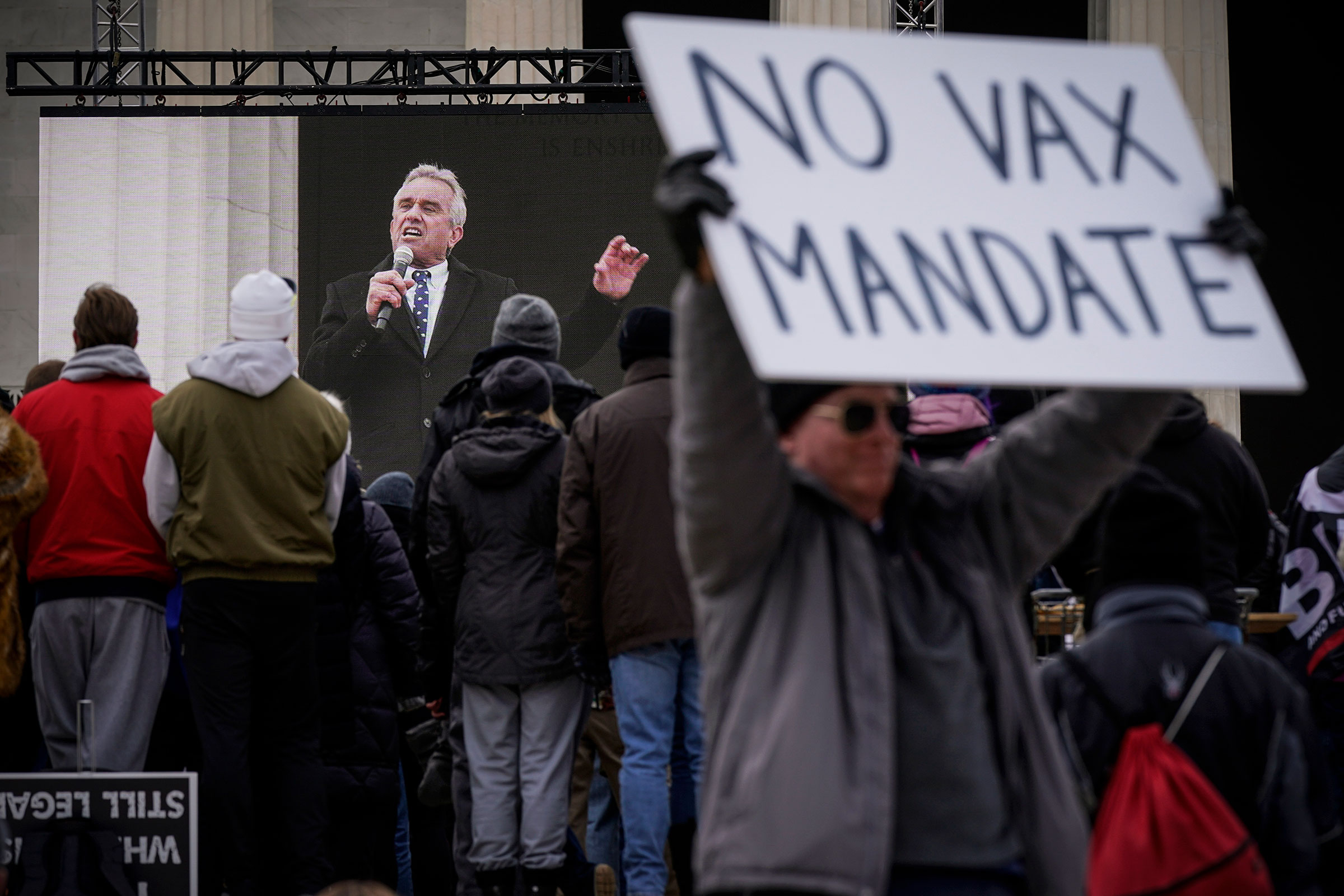
Which is fine with Kennedy. “He’s desperate to talk to the American public, and he’s out there doing it every day, going on every platform that will let him on,” says Tony Lyons, his friend and publisher, who is now working on a super PAC backing his campaign. “I think he really believes that this is his moment, and that the American people are ready for it.”
Robert F. Kennedy Jr., age 69, is the fifth member of the Kennedy clan to run for President, and his campaign has sought to capitalize with a heavy dose of 1960s nostalgia, from vintage signs to constant references to “my uncle” and “my father.” Watching him hold forth with a cup of tea in his living room, his three dogs playing by his feet, feels like looking through a fun-house mirror at a figure both familiar and distorted. He is a vision of what his father might have looked like had he been allowed to grow old, with the same rolled-up sleeves, sharp blue eyes, and weathered tan. His speeches are delivered in a voice strained by spasmodic dysphonia, a vocal disorder that came on suddenly when he was 42, and which he has suggested is a side effect of the flu vaccine. While he usually goes by Bobby, like his father, his campaign decided to go with the more formal Robert.
In a corner of the living room, there’s a picture of his father, beaming in a bright red snowsuit, on a framed 1965 cover of Life magazine celebrating his summit of a Canadian peak, which was rechristened Mount Kennedy. Across the room hangs his dad’s voter–registration card. A bronze bust of his uncle, President John F. Kennedy, keeps watch from a console. An enlarged black-and-white photo on a wall shows 7-year-old Bobby Jr. in the Oval Office in 1961.
Kennedy’s life has been defined by these two men, their violent deaths, and the legacy they bequeathed. The third of Robert and Ethel Kennedy’s 11 children, Bobby Jr. was 9 when his uncle was assassinated in Dallas, and 14 when his father was fatally shot in the kitchen of a Los Angeles hotel in 1968. “I hate to use the words ‘golden boy’ or ‘chosen one,’” says Dick Russell, a longtime colleague who just published a biography titled The Real RFK Jr.: Trials of a Truth Warrior. “But he was the one in the family who was kind of looked to as the one to carry that mantle.”
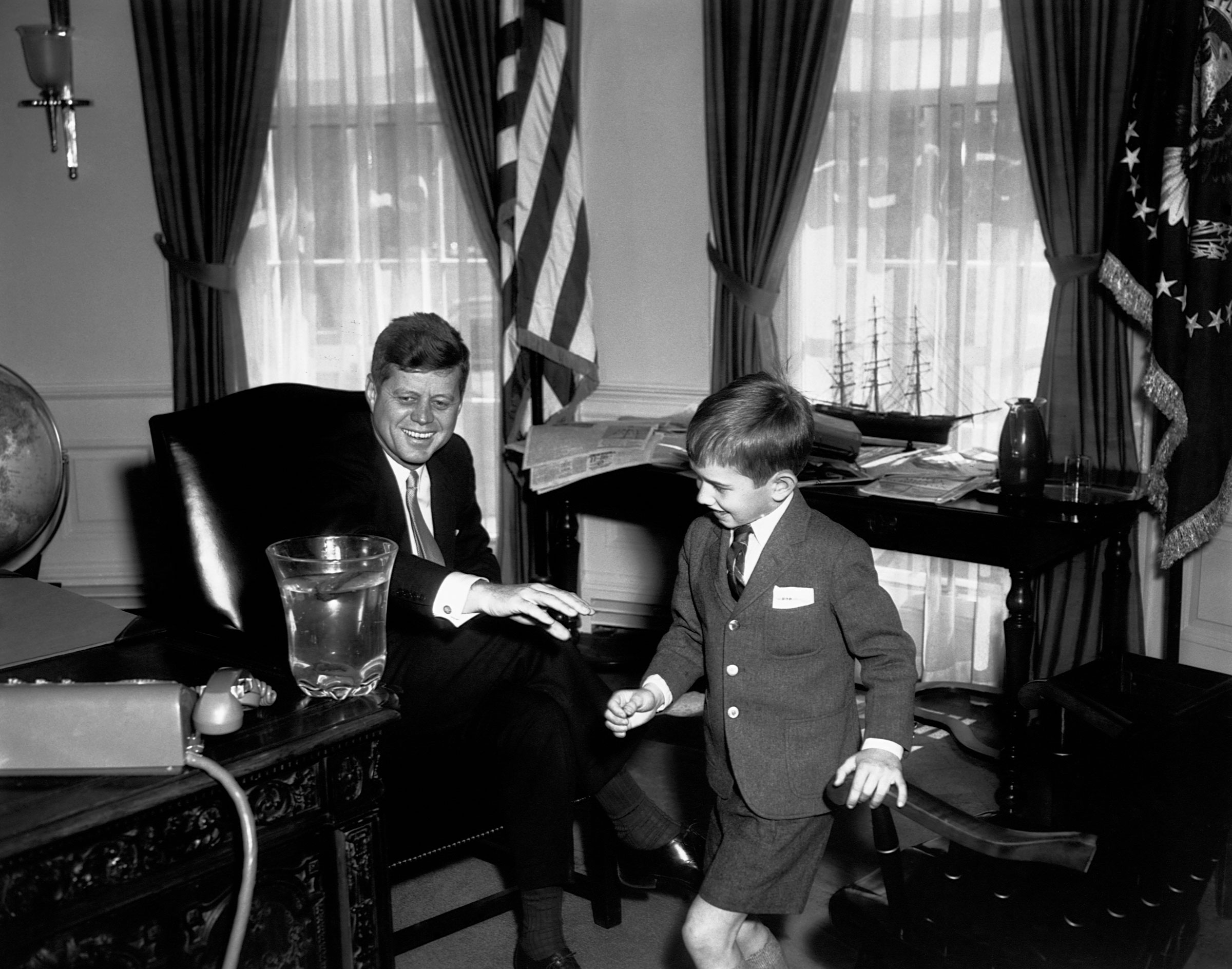
After his father was killed, Kennedy “struggled to be a grown-up,” as he puts it. He was kicked out of boarding schools and busted for marijuana possession, though he still attended Harvard. He failed the bar exam and struggled with addiction. In the early 1980s, after being charged with heroin possession, he entered a drug-rehab facility.
While volunteering for an environmental nonprofit during his probation period, he found the cause to which he would dedicate much of his life. Kennedy threw himself into environmental law, fighting to clean up the Hudson River and prosecute polluters. He created a legal clinic at New York’s Pace University that enlisted law students to work on environmental cases, which became a model for projects around the country, and received accolades for his work focused on Indigenous communities. A 1995 cover of New York magazine hailed him as “The Kennedy Who Matters.”
He turned down opportunities to run for office, saying he needed to focus on his six children. He continued to sue corporations he saw as polluting for profit: coal, oil, pesticides. Then, in the 2000s, he turned his attention to vaccines after being contacted by parents who claimed their children had been injured by them. Kennedy “went down a wormhole,” as he put it to his biographer. He reconsidered his son’s peanut allergies and his experience as a summer-camp counselor. (“I never saw anybody with autism,” he says.)
Over time, perceptions of Kennedy shifted from widely respected environmental crusader to conspiratorial outcast. He joined a struggling nonprofit called the World Mercury Project in 2016 and rebranded it as Children’s Health Defense, which became one of the country’s largest anti-vaccination advocacy groups. It falsely claims that a variety of childhood illnesses are being caused by the ingredients in vaccines, as well as fluoride, acetaminophen, and 5G wireless technology. Kennedy gave speeches, wrote articles, and produced videos claiming that vaccines were “making our children dumber and … giving them injuries.” He saw the ensuing criticism from scientists and public-health agencies as confirmation that he was right. Pharmaceutical companies were pushing harmful substances on children, he argued, and U.S. regulators were lying about it the same way they had about river pollution.
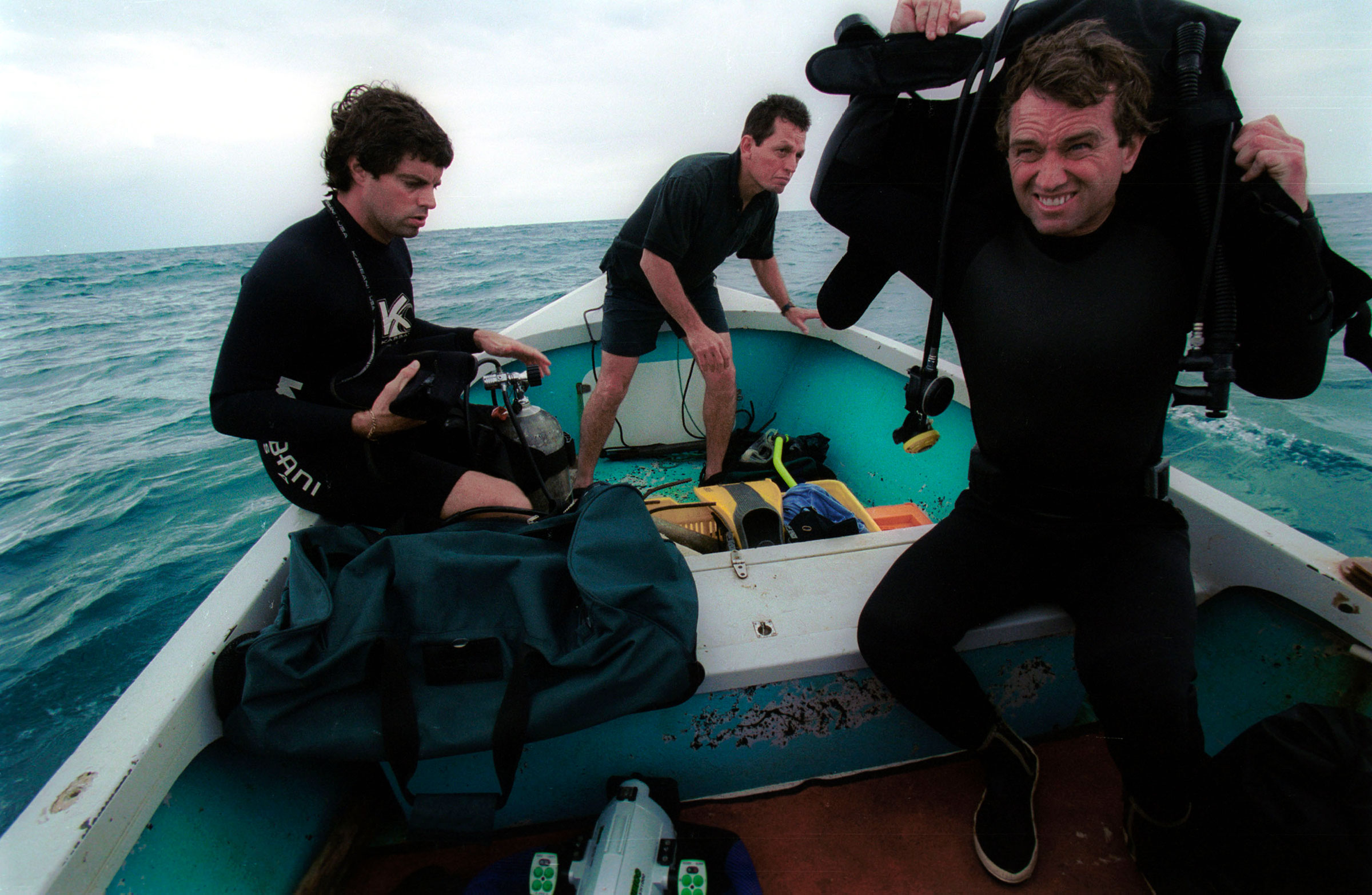
Invitations for interviews and public speeches dried up. “Once I started talking about vaccines, they didn’t just censor me on vaccines, they censored me on everything,” he says. In 2009, the Obama Administration reportedly briefly considered him for an EPA appointment, but decided it would be too controversial. In 2016, he met with the Trump Administration about a post on a vaccine commission, which also did not materialize.
Kennedy became more vocal about other theories: that the 2004 election had been stolen; that the CIA had killed his father; that 5G has been set up “to harvest our data and control our behavior.” In 2019, three members of the Kennedy family published an op-ed in which they said that while they loved him, he was “tragically wrong” about vaccines, and “part of a misinformation campaign that’s having heartbreaking—and deadly—consequences.”
The COVID-19 pandemic brought a new audience for Kennedy’s fringe views. He gained a following in online right-wing groups. The Children’s Health Defense Fund’s revenue doubled to $6.8 million in 2020, and then again to $16 million in 2021. That year, Kennedy published a book titled The Real Anthony Fauci, in which he accuses the top U.S. infectious–disease doctor of orchestrating “a historic coup d’état against Western democracy.” It sold more than a million copies. In January 2022, Kennedy was a prominent speaker at a rally at the Lincoln Memorial. Addressing a predominantly right-wing crowd of thousands, he denounced COVID-19 health measures and invoked Anne Frank to suggest that unvaccinated Americans have less freedom than Jews during the Holocaust. (He later apologized.)
It had taken decades, but Kennedy realized he finally had an audience for the causes that friends say he genuinely believes in and has championed at great personal sacrifice. “That was the first time I seriously thought about running for President,” he says. Kennedy says Hines jokes she’ll deal with the campaign by going to the Bahamas and inventing “a new kind of margarita that has Xanax in it.” At this point, he is used to his views making family members uneasy. “There’s nothing I can really do about it,” he says. “If I was worried about people not having an accurate view of me, I’d be in a state of anxiety all the time.”
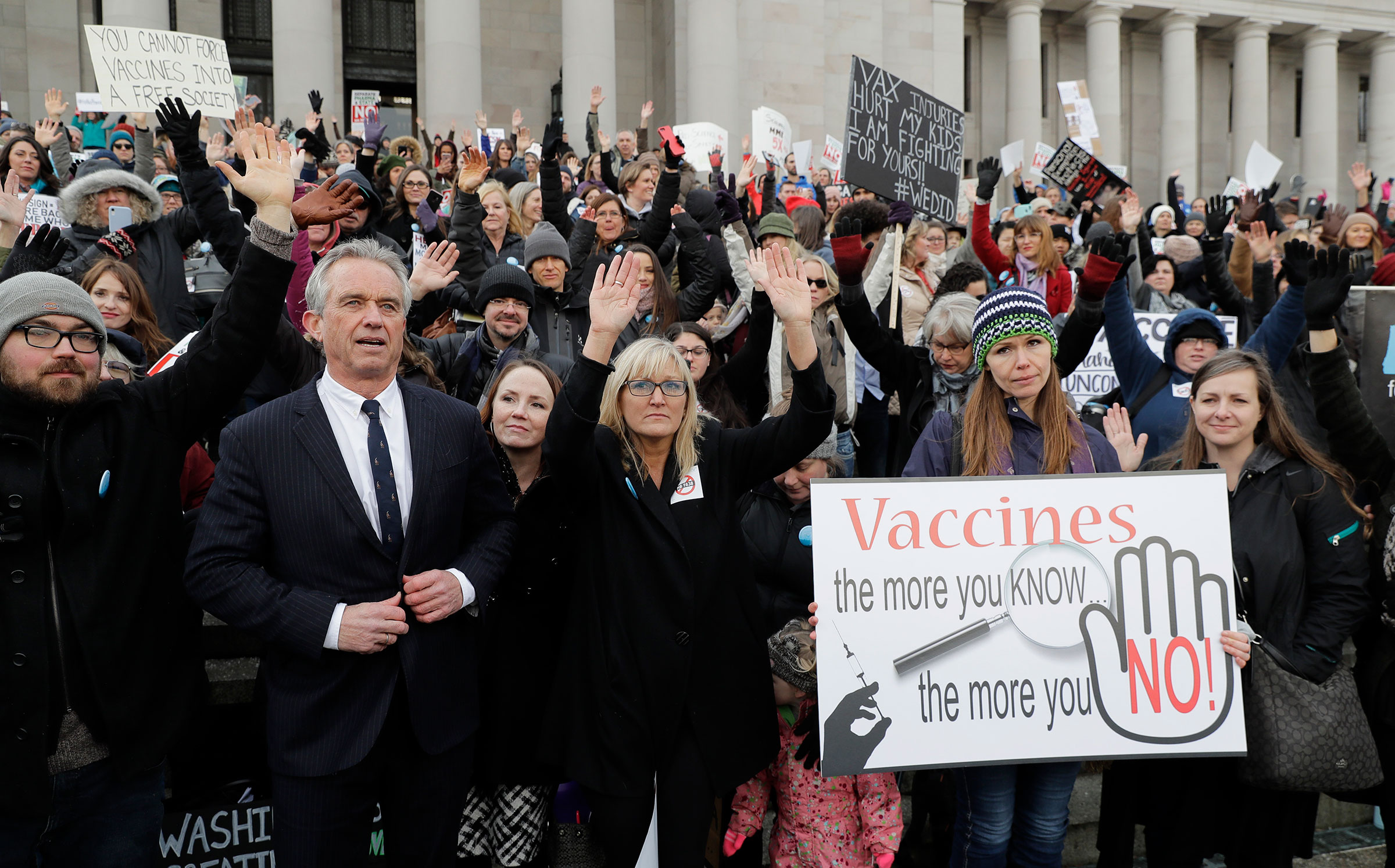
Kennedy was 50 minutes into an almost two-hour speech announcing his candidacy on April 19 when he first seemed to pause and take a breath. “I want to move on to another issue that nobody’s really gonna want to talk about, but I need to,” he said from the stage of a Boston hotel, having just finished a diatribe about coal companies. “This is what happens when you censor somebody for 18 years. I got a lot to talk about.” But he did not mention the vaccine issue that has come to define him, instead railing against corporate control of politics, government, and the media. He also played up his lineage, mentioning his father and uncle more than 30 times.
Kennedy insists his campaign is a continuation of their legacy. “We have a growing number of liberals who are trying to find their way back to their roots, to Kennedy liberalism,” he says. “And I represent that better than anybody.” Along the way, he intends to court Republicans and independents. “These people who are supporting me, many of them would otherwise be supporting Donald Trump,” he says. “It’s the same way when my dad died, many of the whites who supported him went [over] to George Wallace, who was a rabid segregationist.” He adds, “What my father tried to do, and what I will try to do, is to appeal to those people, but a different side of them.”
Kennedy has long moved comfortably between political spheres. He filmed a nature documentary with Roger Ailes in the 1970s, campaigned for Hillary Clinton in 2000, and flew his family on Trump’s private jet. (“Not a great guy at all,” Kennedy says). During the pandemic, he met with Florida Governor Ron DeSantis to discuss COVID-19 restrictions. He also considers Joe Biden a “close family friend for 40 years.” The conservative Silicon Valley investor David Sacks is co-hosting a $10,000-per-ticket dinner for Kennedy on June 15.
“Bobby is the real deal,” says John Gilmore, who worked with Kennedy on the Children’s Health Defense Fund and now runs his super PAC, American Values 2024, which has so far raised close to $6 million. “He’s been pilloried in the press, he’s lost jobs, he’s been pushed out of organizations, he gets trashed sometimes by members of his own family. So he’s not a poser, to say the least.”
The super PAC has taken out ads in newspapers, promising that Kennedy will “take back your country,” but is still figuring out how to use social media to promote a candidate who has been deplatformed in the past for spreading medical misinformation. Instagram only recently reinstated his account because “he is now an active candidate for President of the United States,” according to a spokesman. “Running for President makes it much more difficult for people to censor me,” says Kennedy.
The strategy that allies have landed on is to focus on podcasts and alternative media. Kennedy believes the 2024 election could be “decided by podcasts,” and he intends to use them to full advantage. “In the same way that my uncle sort of realized that television was a good medium for him in 1960, and Trump discovered that he could communicate with these large groups of people on Twitter in 2016,” Kennedy says, “I think podcasts are a good medium for me.”
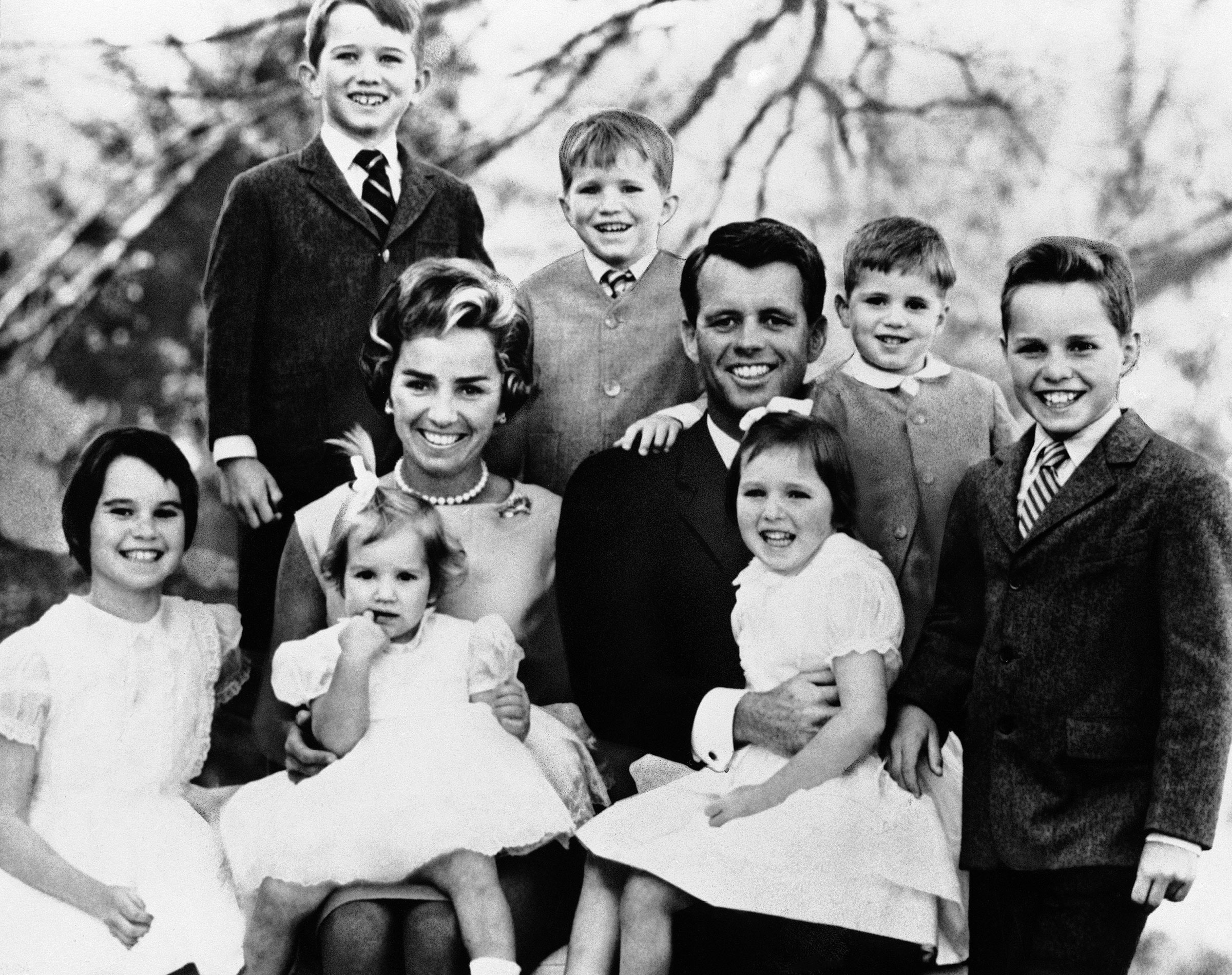
In the past few weeks, Kennedy has appeared on dozens of podcasts and online shows, holding conversations with actor Russell Brand, right-wing commentator Jordan Peterson, right-wing activist James O’Keefe, and Musk. “I’ll talk to anybody,” he says, although he recently crossed two names off that list: Steve Bannon and Jones. (“My marriage could not survive,” Kennedy says. “She would kill me.”) Figures on the right are especially attracted to Kennedy’s jeremiads against what he sees as an increasingly authoritarian government and his criticism of U.S. support for Ukraine in its war against Russia, which he calls “a setup by the neocons and the CIA.”
Whether he’s talking about Ukraine, the economy, health care, or technology, Kennedy speaks in numbers and statistics; his book on Fauci had 2,194 footnotes. “People are attracted to the depth of his intellect,” says his campaign manager Dennis Kucinich, the former Ohio Democrat who has his own experience as a long-shot presidential candidate. “There’s no artifice about him at all, [and] he really has touched something that transcends ordinary politics.”
Health experts have a different take. Kennedy’s style of promoting anti-vaccine disinformation is effective “because it’s portrayed to the public with graphs and figures and what appears to be scientific data. He has perfected the art of illusion of fact,” says Michael Osterholm, the director of the Center for Infectious Disease Research and Policy at the University of Minnesota. “It would be one thing if it were merely about a point of politics, but this is about people’s lives. And the consequences of promoting this kind of disinformation, as credible as it may seem, is simply dangerous.”
More from TIME
So far, Kennedy has held only a handful of in-person events. Most of his campaign is online, where #Kennedy2024 has grown into one of the most confusing hashtags on the internet. At 2 a.m. on June 6, he posted a video of himself at the southern border in Arizona, criticizing Biden’s immigration policies. He has a TikTok account where he offers glimpses of his life or views on assorted topics. (One video instructed viewers how to catch crabs on the beach.) He’s been following the advice of Tinder founder Sean Rad, who Kennedy says has been advising his campaign, and his daughter-in-law Amaryllis Fox, an author and former CIA agent who has been running his digital strategy. “She said with TikTok, you want to put sort of unexpurgated, very raw footage,” Kennedy notes.
The candidate seems to be basking in a sense of destiny. “I’ve studied certain realignments that have occurred throughout American history,” he says. “And I think that’s happening now.” His vision is “the unification of left and right in a populist movement,” he says. “That would be unstoppable, right?” In the end, Kennedy’s long-shot candidacy may say more about the state of America in 2023 than it does about the man himself. What matters in the end isn’t whether people support his campaign, he says. It matters that they’re listening.
More Must-Reads From TIME
- The 100 Most Influential People of 2024
- Coco Gauff Is Playing for Herself Now
- Scenes From Pro-Palestinian Encampments Across U.S. Universities
- 6 Compliments That Land Every Time
- If You're Dating Right Now , You're Brave: Column
- The AI That Could Heal a Divided Internet
- Fallout Is a Brilliant Model for the Future of Video Game Adaptations
- Want Weekly Recs on What to Watch, Read, and More? Sign Up for Worth Your Time
Write to Vera Bergengruen/Los Angeles at vera.bergengruen@time.com